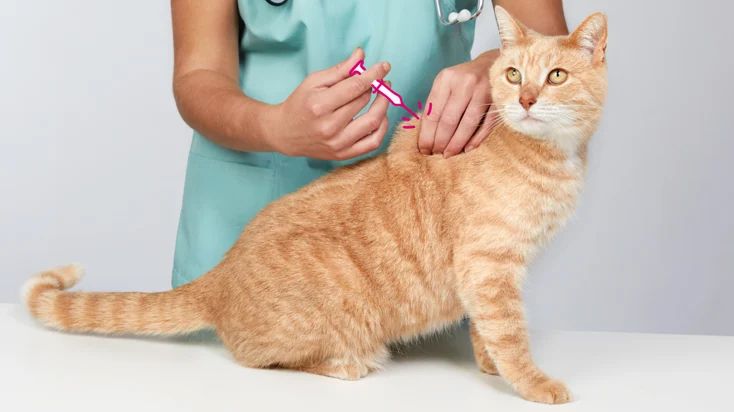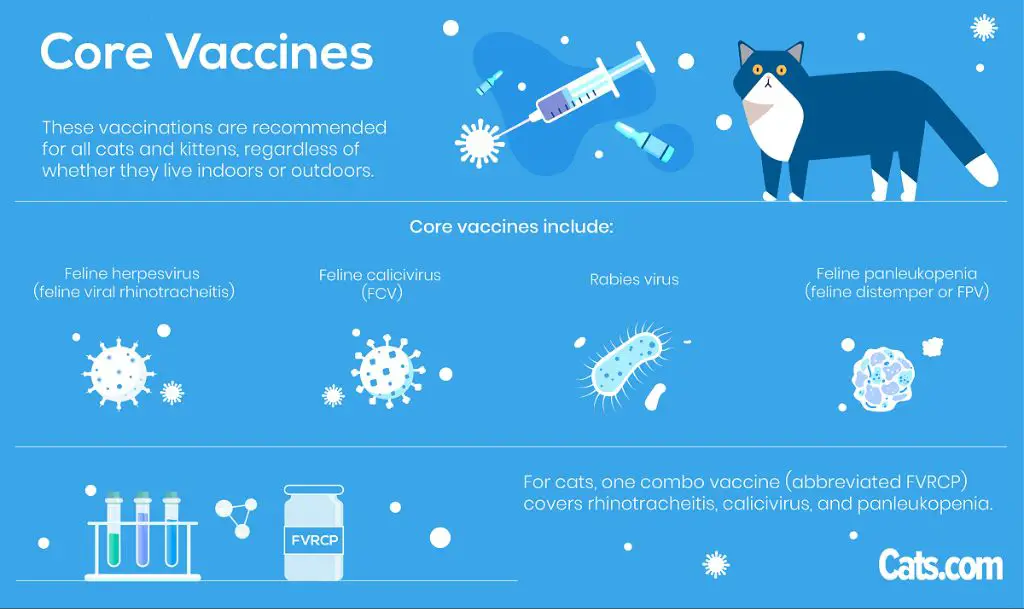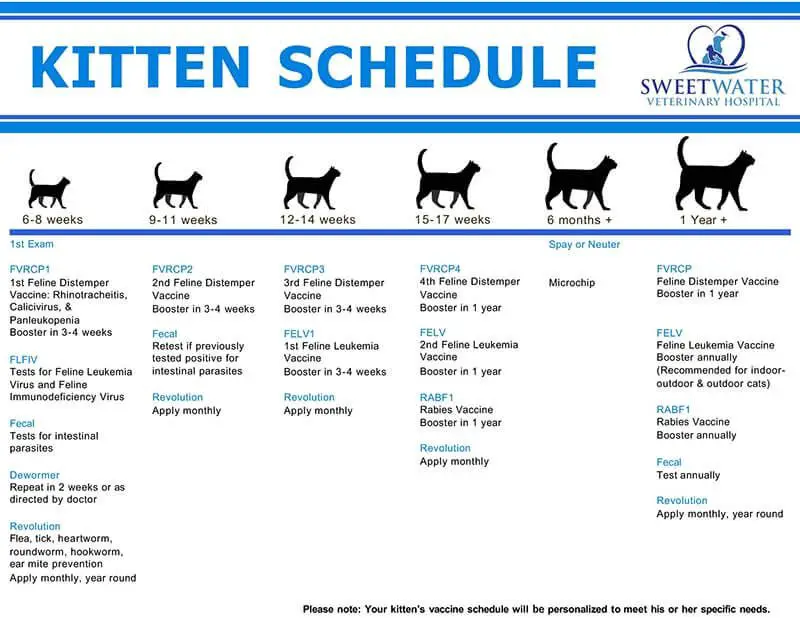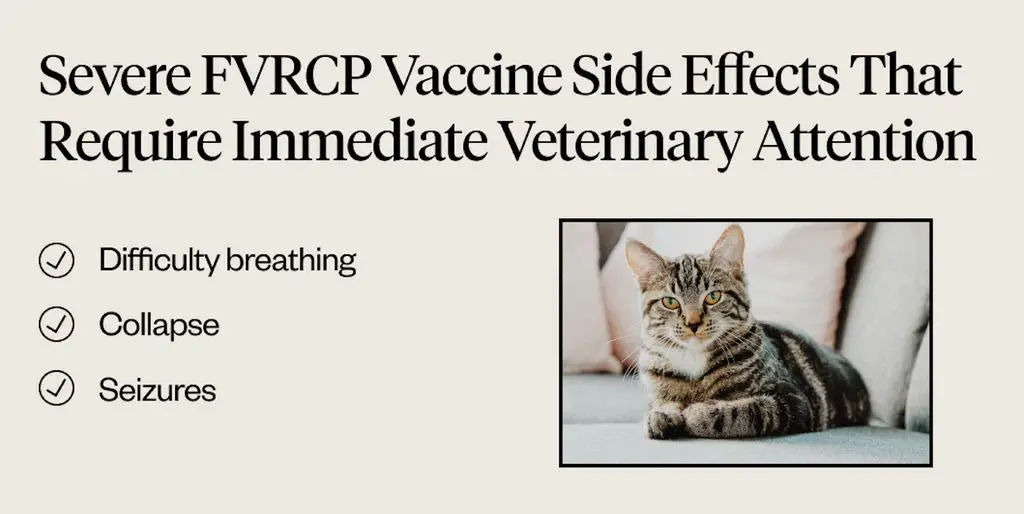Cat vaccinations, also known as cat jabs, are injections given to cats to help prevent them from getting sick from certain diseases and illnesses. Vaccines stimulate cats’ immune systems to produce antibodies that fight off specific viruses, bacteria, or other disease-causing organisms so the cats develop immunity to those diseases. Properly vaccinating cats is extremely important for their health and wellbeing. Vaccines protect cats against dangerous and sometimes fatal diseases like feline panleukopenia, calicivirus, herpesvirus, rabies, chlamydiosis, feline leukemia virus, and more.
It’s crucial to give kittens and cats the core vaccines recommended by veterinarians. Kittens need a series of vaccines as their immune systems mature. Adult cats need timely vaccine boosters to maintain effective immunity over the years. Vaccinating cats per veterinary guidelines is the best way to curb the spread of infectious diseases and keep cats healthy and safe from preventable illnesses for their entire lives. Unvaccinated and undervaccinated cats are at high risk of contracting deadly diseases. Responsible cat owners must make sure their cats receive proper vaccinations on schedule to protect them and their community.
Common Cat Vaccines
There are some core vaccines that all cats should receive to protect against common and deadly diseases (1). These include:

- Rabies – Rabies is a fatal viral disease that affects the central nervous system. Rabies vaccination is required by law in most states (1).
- Panleukopenia (FPV) – Also known as feline distemper, panleukopenia is a highly contagious and often fatal viral disease that attacks the gastrointestinal tract and immune system (1).
- Rhinotracheitis – Caused by feline herpesvirus-1 (FHV-1), rhinotracheitis causes upper respiratory infection with symptoms like sneezing, nasal discharge, and eye inflammation. It is easily spread between cats (1).
- Calicivirus – Another major cause of upper respiratory infections in cats. Calicivirus can also cause painful oral ulcers (1).
Vaccinating for these core diseases protects cats against some of the most common and serious feline illnesses. Kittens should receive a series of vaccines for core diseases starting around 6-8 weeks of age, with boosters continuing through 16-20 weeks old (1). Adult cats need regular boosters to maintain immunity.
Non-Core Vaccines
In addition to the core vaccines, there are some other non-core vaccines that may be recommended for cats in certain situations. These include:

Feline Leukemia Virus (FeLV)
The FeLV vaccine protects against feline leukemia virus, which weakens the immune system and can lead to cancer. It is usually recommended for outdoor cats or those exposed to other felines. Kittens can receive their first FeLV vaccine as early as 8 weeks old.
Chlamydia
The Chlamydia or Chlamydophila vaccine protects against a bacteria that can cause upper respiratory infections. It may be recommended for cats going into a shelter environment or multi-cat households.
Bordetella
The Bordetella vaccine helps prevent bordetellosis or “kennel cough.” It is sometimes given to cats who are boarded frequently or come into contact with many other cats.
Feline Infectious Peritonitis (FIP)
The FIP vaccine aims to prevent the fatal coronavirus infection FIP. It is still somewhat controversial and only recommended for high-risk cats in catteries or multi-cat homes.
In general, non-core vaccines are optional unless the cat is at higher risk of exposure. Vets will make recommendations based on the cat’s lifestyle and risk factors.
When to Vaccinate Kittens
The standard vaccination schedule for kittens under 16 weeks old is as follows:

6-8 weeks: Kittens should receive their first FVRCP vaccine at this age. The FVRCP vaccine protects against three major viruses: feline viral rhinotracheitis (FVR), calicivirus (C), and panleukopenia (P). Some vets may also recommend the first FeLV vaccine at this age. [1]
9-11 weeks: Kittens should receive their second FVRCP vaccine 2-4 weeks after the first. Vets may recommend an optional FeLV vaccine at this age if the kitten did not receive one at 6-8 weeks. [2]
12-14 weeks: Kittens should receive their third and often final core FVRCP vaccine 2-4 weeks after the second. Vets may recommend an optional second FeLV vaccine at this age if the kitten received an initial FeLV vaccine earlier.
16 weeks: Some vets recommend a final FVRCP booster at this age before transitioning the kitten to an adult vaccination schedule.
The core FVRCP vaccine is considered extremely important for all kittens to build immunity against major feline viruses. Additional non-core vaccines like FeLV may be recommended depending on the kitten’s lifestyle and risk factors.
Vaccinating Adult Cats
Most adult cats need to receive booster vaccinations regularly to maintain immunity against common feline diseases. According to the American Association of Feline Practitioners, adult cats should receive the following core vaccines every 1-3 years based on risk factors:
- Rabies – Given every 1-3 years depending on local laws and vaccine type used.
- FVRCP – Protects against feline viral rhinotracheitis, calicivirus, and panleukopenia viruses. Given every 1-3 years.
- FeLV – Feline leukemia virus vaccine. Given annually for cats at risk of exposure.
Some vets may also recommend certain non-core vaccines like feline infectious peritonitis (FIP), Chlamydophila felis, and Bordetella bronchiseptica on a case-by-case basis. It’s important to follow your vet’s recommendations for your specific cat.
Keeping up with regular adult boosters is crucial to maintaining your cat’s immunity. Allowing too much time to lapse between vaccines can leave your cat vulnerable. Core vaccines should never be skipped for adult cats unless a medical condition prohibits vaccination.
Importance of Boosters
Booster vaccinations are important for maintaining your cat’s immunity against disease. Vaccines stimulate protective immune responses, but over time these responses can wane. According to researchers at VCA Hospitals, there is no evidence that skipping annual booster shots benefits cats. In fact, published studies show that abstaining from boosters can leave cats vulnerable to infection. Boosters renew the protective immune memory responses stimulated by the initial vaccination.
According to Cornell University’s Feline Health Center, no vaccine provides 100% effectiveness. Regular boosters help strengthen immunity against diseases like panleukopenia, calicivirus, herpesvirus, and rabies. They recommend core vaccines be boostered a year after the initial kitten series and every 3 years thereafter. More frequent boosters may be advised for higher risk cats. Work with your veterinarian to determine the optimal booster schedule for your cat’s lifestyle and risk factors.
Possible Side Effects
Most cats tolerate vaccines well, but some mild side effects can occasionally occur. The most common side effects after vaccination are lethargy, reduced appetite, and soreness at the injection site that lasts a few days.

According to ManyPets, these mild vaccine reactions are not a cause for concern and tend to resolve on their own within a day or two. However, the website does recommend contacting your veterinarian if these symptoms persist longer than 48 hours.
Though rare, cats can also experience more severe vaccine reactions like facial swelling, hives, or difficulty breathing. These hypersensitivity responses may indicate a preexisting allergy and require immediate veterinary attention as they can progress to anaphylaxis. Anaphylaxis is a life-threatening allergic reaction that constricts the airways and causes a dangerous drop in blood pressure. Thankfully, veterinarians are prepared to treat anaphylaxis if it occurs.
While the risk of serious vaccine reactions is quite low, ManyPets stresses the importance of remaining for at least 15 minutes at the vet clinic after vaccination to monitor for any adverse effects before heading home.
Vaccine Guidelines
There are clear veterinary guidelines on what vaccines cats should receive and when from organizations like the American Animal Hospital Association (AAHA) and the American Association of Feline Practitioners (AAFP). The 2020 AAHA/AAFP Feline Vaccination Guidelines recommend the following vaccine schedule:
Kittens
- Start core vaccines (FHV-1, FCV, FPV) every 2-4 weeks from 6-8 weeks of age until 12-16 weeks old
- Give rabies vaccine at 12-16 weeks if required by law
- Administer FeLV vaccine to kittens younger than 1 year old
Adult Cats
- Give core vaccine boosters (FHV-1, FCV, FPV) every 3 years or more frequently
- Administer rabies vaccine boosters as required by law (1-3 years)
- Titer testing can help determine if boosters are needed
These guidelines are based on extensive research and are designed to provide the best protection against disease while minimizing risks. Following them helps pet owners keep their cats up-to-date on all recommended vaccines.
Owner Responsibilities
As a responsible cat owner, it is crucial to keep your cat’s vaccines up-to-date according to the schedule recommended by your veterinarian. Keeping accurate medical records is key to ensuring your cat receives all needed vaccines at the proper intervals. Ask your vet for copies of your cat’s vaccine records each visit and store them in a safe place at home. Set reminders on your calendar when your cat is due for upcoming boosters. An annual wellness exam is also recommended to review your cat’s overall health and vaccination status. Staying on schedule with core vaccines like rabies, panleukopenia, rhinotracheitis, and calicivirus can help protect your cat from deadly infectious diseases. According to the 2020 AAHA/AAFP Feline Vaccination Guidelines, “Core vaccines are recommended for all cats with minimal exceptions.” By keeping vaccines current, cat owners fulfill an essential responsibility in promoting the health and wellbeing of their feline companions.
Conclusion
Continuing to vaccinate cats throughout their lives is crucial to protecting them against serious and sometimes fatal diseases. Vaccines work by stimulating the immune system to produce antibodies that will fight off specific infections if encountered in the future. Core vaccines that every cat should receive include feline panleukopenia virus, calicivirus, herpesvirus, and rabies. Additional non-core vaccines may be recommended by your veterinarian based on risk factors like indoor/outdoor lifestyle, health status, geographic location and more.
While vaccine guidelines provide a framework, each cat is unique. It’s important for owners to partner with their veterinarian to develop an individualized vaccine plan that provides maximum protection. An annual exam allows evaluation of antibody levels and overall wellness to determine if boosters are needed. While vaccines are extremely safe, mild side effects can occasionally occur and should be discussed with your vet.
By staying up to date on all recommended vaccines, you can do your part to keep your cat healthy and give them the longest, happiest life possible. Don’t hesitate to consult your veterinarian with any questions or concerns about vaccines so that together you can make the best decisions for your feline companion.
